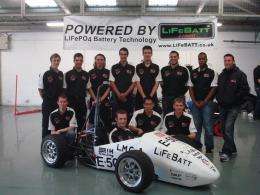First Completely Electric Formula Student Racing Car

The University of Hertfordshire’s Formula Student team raced the world’s first completely electric Formula Student car and won in this month’s Institution of Mechanical Engineers Formula Student competition.
The car, which raced at Silverstone from 16-19 July and won the Low Carbon and Fuel Cell Technology Award for Lowest Carbon Production Car, is the world’s first electric Formula Student racing car to compete in and win the competition.
“We are the first team to enter a pure electric racing car into this competition, and are still the only University to win Class 1(A),” said James Major, a final year student in Automotive Engineering who led the team which developed the car.
According to James, the car which was developed to a budget of £14,000 can hit speeds of 55 miles per hour, and running costs average at about a penny a mile.
It also has zero tail pipe emissions and although there is come carbon production involved in the making of electricity in the first place, this can be avoided by obtaining the electricity from renewable energy sources.
The University was also the outright winner for Class 1A and was awarded the Cenex Cup.
Formula Student is about building future engineering talent by designing and producing a single-seater racing car, not just in design and manufacture, but in many of the management, marketing and people skills so vital in the modern world, across all sectors of employment.
Source: University of Hertfordshire